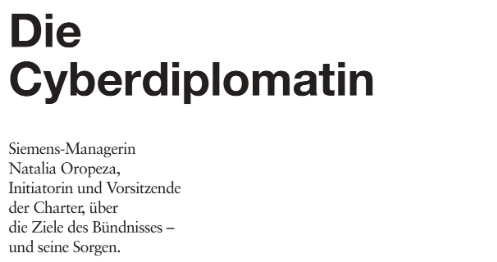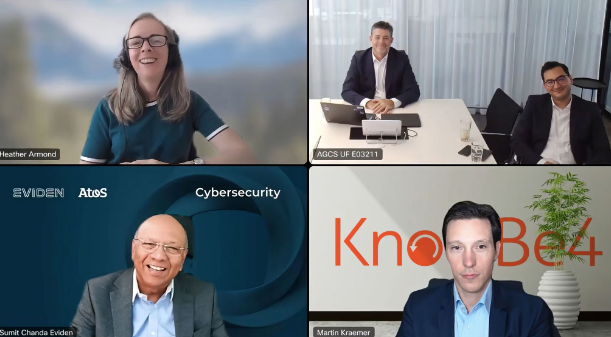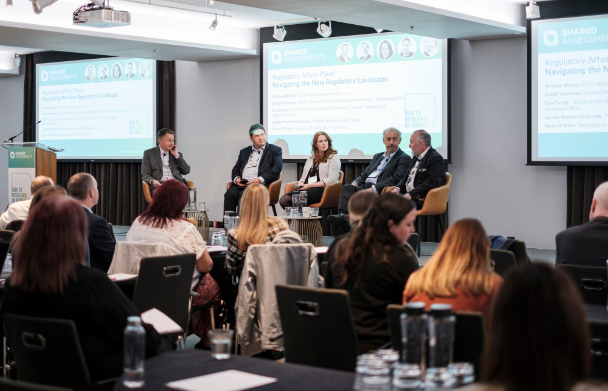At the Munich Security Conference today, Siemens and eight partners from industry will sign the first joint charter for greater cybersecurity. Initiated by Siemens, the Charter of Trust calls for binding rules and standards to build trust in cybersecurity and further advance digitalization.
In addition to Siemens and the Munich Security Conference (MSC), the companies Airbus, Allianz, Daimler Group, IBM, NXP, SGS and Deutsche Telekom are signing the Charter. The initiative is further welcomed by Canadian foreign minister and G7 representative Chrystia Freeland as well as witnessed by Elżbieta Bieńkowska, the EU Commissioner for Internal Market, Industry, Entrepreneurship and Small and Medium-sized Enterprises.
“Confidence that the security of data and networked systems is guaranteed is a key element of the digital transformation,” said Siemens President and CEO Joe Kaeser. “That’s why we have to make the digital world more secure and more trustworthy. It’s high time we acted – not just individually but jointly with strong partners who are leaders in their markets. We hope more partners will join us to further strengthen our initiative.”
The Charter delineates 10 action areas in cybersecurity where governments and businesses must both become active. It calls for responsibility for cybersecurity to be assumed at the highest levels of government and business, with the introduction of a dedicated ministry in governments and a chief information security officer at companies. It also calls for companies to establish mandatory, independent third-party certification for critical infrastructure and solutions – above all, where dangerous situations can arise, such as with autonomous vehicles or the robots of tomorrow, which will interact directly with humans during production processes. In the future, security and data protection functions are to be preconfigured as a part of technologies, and cybersecurity regulations are to be incorporated into free trade agreements. The Charter’s signatories also call for greater efforts to foster an understanding of cybersecurity through training and continuing education as well as international initiatives.
“Secure digital networks are the critical infrastructure underpinning our interconnected world,” said Canadian foreign minister Chrystia Freeland. “Canada welcomes the efforts of these key industry players to help create a safer cyberspace. Cybersecurity will certainly be a focus of Canada’s G7 presidency year.” The matter is also a top priority for the Munich Security Conference. “Governments must take a leadership role when it comes to the transaction rules in cyberspace,” said Wolfgang Ischinger, Chairman of the Munich Security Conference. “But the companies that are in the forefront of envisioning and designing the future of cyberspace must develop and implement the standards. That’s why the Charter is so important. Together with our partners, we want to advance the topic and help define its content,” he added.
In a digitalized world, the threats to cybersecurity are steadily growing: According to Gartner, 8.4 billion networked devices were in use in 2017 – a 31-percent increase over 2016. By 2020, the figure is expected to reach 20.4 billion.


You may also like

Chairwoman Natalia Oropeza in Brandeins Magazine
In an interview with Dorit Kowitz, Natalia dives deep into the pressing issues facing the cybersecurity landscape, explaining how the Charter of Trust bundles the expertise of different businesses across several regions to stay resilient in the face of evolving threats. As Natalia Oropeza says: "We all win if cybercrime doesn’t win."
Here are three key insights from her interview:
🔑 Collaboration is essential: No single organization can tackle cyber threats alone. The Charter of Trust is a prime example that businesses nowadays are more transparent when it comes to attacks and that sharing information in this field can be beneficial.
🔑 Addressing the digital skills gap: The Charter of Trust is working to address the global shortage of cybersecurity professionals by encouraging diversity and actively promoting opportunities for women to join the field.
🔑 Unified regulations: Harmonizing global cybersecurity standards will reduce vulnerabilities, helping businesses and governments combat threats more effectively.
The full interview is available here: https://lnkd.in/gRm6ZDGC


Cybersecurity Awareness Month
The complexity and urgency of this topic gathered a lot of interest, with 600+ attendees throughout the whole panel, which was composed of Jon-Paul Jones, COO at AZ Commercial, Firas Ben Hassan, GenAI expert & Manager of AllianzGPT at AZ Technology, Dr. Martin J. Krämer, External Security Awareness Advocate at KnowBe4, and Dr Sumit Chanda, Global CISO at Eviden & Chair of the Global External Engagement Working Group at the Charter of Trust.
We are pleased to see Dr. Sumit Chanda from Eviden bringing in his unique CISO insight on what these emerging technologies mean in day-to-day cybersecurity practices and bringing in the Charter of Trust perspective on this topic as well.
Thank you, Ervin Cihan and Haydn Griffiths for inviting other CoT Partners and for the great initiatives that Allianz is putting together within this year’s Security Awareness Month. And special thanks to Heather Armond for the great moderation.


UK/EU Summit - “Risk to Resilience”
💡Under the theme “Risk to Resilience” the first event of this series was held in London and brought together professionals from different industries and regions. Detlef participated in the panel about the complex regulatory landscape and emphasized that new legislation like the EU AI Act, DORA and Hashtag#NIS2 continue to push the standard of care on cybersecurity and other risks.
Thanks to Shared Assessments for organizing such an amazing event and inviting the Charter of Trust to participate in this high-class panel alongside Andrew Moyad, CEO at Shared Assessments.



